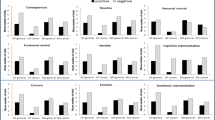Abstract
This study evaluates the influence of different factors in the adaptation process activated by uncertainty in illness on health-related quality of life. The sample included 100 women (mean age = 52.1 years) receiving treatment for newly diagnosed (M=52.1 months) gynaecological cancer (38 cervical, 26 ovarian, 24 endometrial, 7 uterine, 4 vulvar, and 1 vaginal). Stepwise regression analyses identified mood states, ambiguity about illness-wellness state, dangerfocused appraisal and mastery as key predictors of four health-related quality of life scores. The variance accounted for by those variables is reflected in cumulative multipleR 2 of 0.56 for total quality of life score, 0.57 for psychosocial well-being, 0.235 for physical well-being and 0.25 for disease/symptom distress. These variances do not reflect the contribution of age, time since diagnosis, metastasis and stage of cancer which were forced to enter the regression equation first. The latter set of variables accounted for a smaller portion of the variance in health-related quality of life (R 2=0.03–0.195). Coping strategy did not predict health-related quality of life. These findings provide beginning support for conceptualizing health-related quality of life as the outcome of an adaptation process explained by the uncertainty in illness theory. However, uncertainty in illness theory may not be sufficient to predict quality of life outcomes. Future research should consider the addition of discrepancy theory to guide the selection or development of a health-related quality of life measure, to account for the perceived discrepancy between actual experience and expected well-being.
Similar content being viewed by others
References
Padilla GV, Ferrell B, Grant MM, Rhiner M. Defining the content domain of quality of life for cancer patients with pain.Cancer Nurs 1990;13: 108–115.
Padilla GV, Grant MM, Lipsett J, Anderson PR, Rhiner M, Bogen C. Health, quality of life and colorectal cancer.Cancer (accepted for publication).
Walker CS.Quality of Life: Assessment and Applications. London: MTP Press, 1987.
Cella DF, Cherin EA. Quality of life during and after cancer treatment.Compr Therapy 1988;14: 69–75.
Grant MM, Padilla GV, Ferrell BR, Rhiner M. Assessment of quality of life with a single instrument.Sem Oncol Nurs 1990;6: 260–270.
Mishel MH. The measurement of uncertainty in illness.Nurs Res 1981;30: 258–263.
Mishel MH. Uncertainty in illness.Image: J Nurs Scholarship 1988;20: 225–232.
Mishel MH. Reconceptualization of the uncertainty in illness theory.Image: J Nurs Scholarship 1990;22: 256–264.
King B, Mishel MH. Uncertainty, appraisal and management in chronic illness. Paper presented at the 19th Communicating Nursing Research Conference, Western Society for Research in Nursing, Portland OR, April, 1986.
Mishel MH. Padilla G, Grant M, Sorenson DS. Uncertainty in illness theory: a replication of the mediating effects of mastery and coping.Nurs Res 1991;40: 236–240.
Spitzer WO, Dobson AJ, Hall J, Chesterman E, Levi J, Shepard R, Battista RN, Catchlove BR. Measuring the quality of life for cancer patients: A concise QL-Index for use by physicians.J Chron Dis 1981;34: 585–597.
Ferrans CE, Powers MJ. Quality of life index: Development and psychometric properties.Adv Nurs Sci 1985;8: 15–24.
Padilla GV, Presant C, Grant MM, Metter G, Lipsett J, Heide F. Quality of life for patients with cancer.Res Nurs Health 1983;6: 117–126.
Padilla GV, Grant M. Quality of life as a cancer nursing outcome variable.Adv Nurs Sci 1985;8: 45–60.
Padilla GV. Gastrointestinal side effects and quality of life in patients receiving radiation therapy.Nutrition 1990;6:367–370.
Mishel MH. Parents' perception of uncertainty concerning their hospitalized child.Nurs Res 1983;32: 324–330.
Folkman S. An approach to the measurement of coping.J Occup Behav 1982;3: 56–107.
Mishel MH. Sorenson DS. Uncertainty in gynecological cancer: a test of the mediating functions of mastery and coping.Nurs Res 1991;40: 167–171.
Folkman S, Lazarus RS. An analysis of coping in a middle-aged community sample.J Health Soc Behav 1980;21: 219–239.
McNair D, Lorr M, Droppleman L.POMS Manual for Profile of Mood States. San Diego, CA: EDITS/Educational and Industrial Testing Service, 1971.
Mor V. Cancer patients' quality of life over the disease course: Lessons from the real world.J Chronic Dis 1987;40: 535–544.
Pearlin LI, Schooler C. The structure of coping.J Health Soc Behav 1978;19: 2–21.
Sullivan E, Padilla GV. Hope, spiritual well-being and quality of life among patients with recurrent ovarian cancer. Paper presented at the 1992 Oncology Nursing Society Congress, San Diego, California, May, 1992.
Padilla GV. The role of nutrition in quality of life.Dietetic Currents 1990;17: 5–8.
Padilla GV, Grant MM, Martin L. Rehabilitation and quality of life measurement issues.Head and Neck Surgery, 1988;10: S156–S160.
Robison J. Effect of written discharge instructions on post-bone marrow transplant patients' level of understanding and quality of life. Abstract inProceedings of 1991 Oncology Nursing Society Abstract, San Antonio, Texas, 1991.
Marchette L, Maclarlane M, Padilla G. Factors related to quality of life in persons living with AIDS. Unpublished report.
Breetvelt IS, VanDam FS. Underreporting by cancer patients: The case of response-shift.Soc Sci Med 1991;32: 981–987.
Linder-Pelz S. Social psychological determinants of patient satisfaction: A test of five hypotheses.Soc Sci Med 1982;16: 583–589.
Cella DF, Lee-Riordan D, Silberman M. et al. Quality of life in advanced cancer: Three new disease specific measures.Proc Am Soc Clinical Oncology 1989;8: 315 (abstract # 1225).
Author information
Authors and Affiliations
Additional information
This study was supported by NCNR Grant No. 3NR011030451, Coping with Uncertainty in Gynaecological Cancer; by DRR Grant No. RR06014, Biomedical Research Support Grant.
Rights and permissions
About this article
Cite this article
Padilla, G.V., Mishel, M.H. & Grant, M.M. Uncertainty, appraisal and quality of life. Qual Life Res 1, 155–165 (1992). https://doi.org/10.1007/BF00635615
Received:
Accepted:
Issue Date:
DOI: https://doi.org/10.1007/BF00635615




